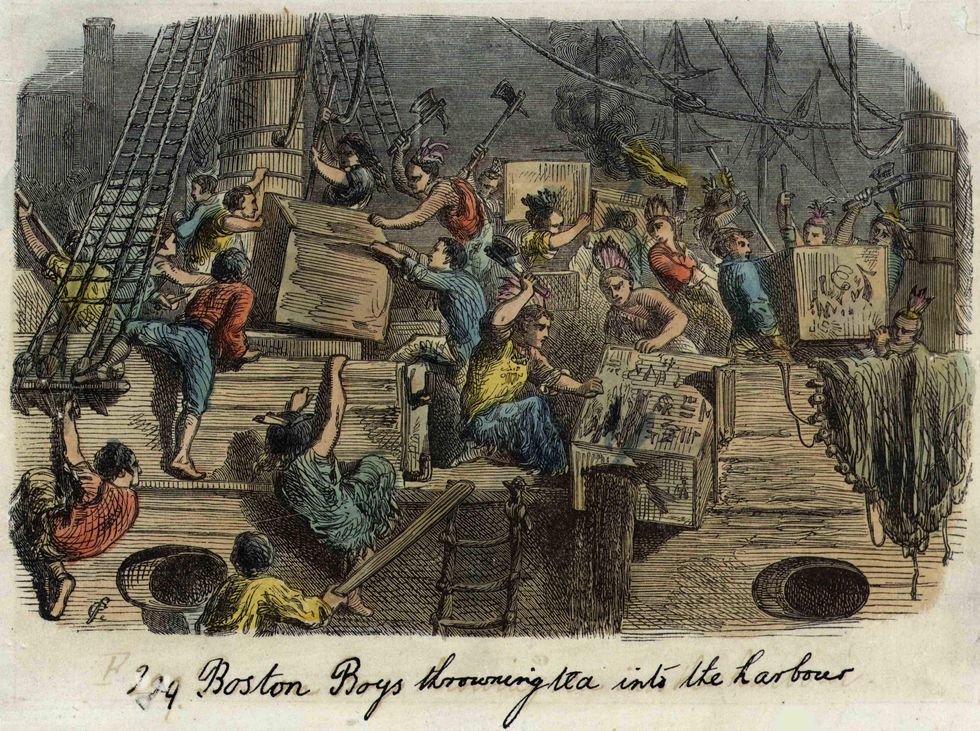BOSTON (DECEMBER 16, 1773) — A group of local colonists upset with British Parliament’s controversial Tea Act took matters into their own hands tonight and dumped hundreds of chests of East India Company tea into Boston Harbor.
More than 100 men, many disguised as Mohawk Indians, boarded three ships at Griffin’s Wharf this cold December evening and in the course of three hours tossed nearly 350 crates containing 90,000 pounds of tea overboard. The financial damages are expected to approach 10,000 British pounds.
According to local sources, the men are members of a secretive group known as the Sons of Liberty and were acting at the urging of one of their most-provocative leaders, Samuel Adams. Adams and his group have rallied against multiple attempts by Great Britain to impose taxes and regulations on colonists who have no government representation in London.
The Tea Act, which passed in May, was simply another move by British rulers to assert increased sovereignty over the colonists through taxation, the Sons of Liberty and other opponents of the measure said. Parliament’s goal, they added, was to prop up the failing government-backed East India Company.
The EIC has long had a government-instituted monopoly on tea in England, where the company has, until recently, been required to sell all of its tea. The high British duties on tea that the EIC has been forced to pay — coupled with a dire famine in India and a booming black market for cheaper tea in the colonies — have led to crashing tea sales and massive financial losses for the company.
English merchants have for decades turned around sold the tea to the American colonies, where a second duty is then collected.
Leaders of the EIC convinced Parliament this spring to pass the Tea Act, which allowed the company, for the first time in its history, to sell tea on consignment directly to a preferred set of sellers in the American colonies’ four most populous ports — New York, Philadelphia, Charleston, South Carolina, and Boston.
The act gave the East India Company a monopoly on tea sales in America and offered refunds to the EIC for tea duties paid in England. However, the duties in the colonies remained untouched. By cutting out the middlemen and allowing for at least some duty relief in England, the EIC was set to undercut tea prices in America.
But the law didn’t impact only the illegal tea-smuggling business.
Local merchants who have long imported EIC tea from England and were not granted the opportunity to buy directly from the EIC have reported that they, too, have seen tea sales plummet. Some of these businessmen fear that the efforts by Parliament to save the favored trading company will force them to close up shop.
The impact on local businesses and the belief that the British crown has once again trampled the rights of colonists who have no voice in the government have led to a movement up and down the East Coast to keep EIC tea off American shores.
Earlier reports from the three other cities where consignees were scheduled to receive EIC tea revealed just how significant the movement to stop the shipments really was. The preferred, government-approved local sellers at all three ports resigned their consignment agreements in early December as addition tea shipments arrived. In New York and Philadelphia, the EIC tea ships were forced to return to England with their cargo. And in Charleston, the tea was taken by local authorities.
But even as people in other colonies banded together to convince their colonial governors to abandon the Tea Act scheme and worked with American ship owners and their captains to avoid destruction of property, the authorities in Massachusetts have been slow to bend. Loyalist Gov. Thomas Hutchinson, whose sons received preferred-seller status from the EIC, repeatedly stated that the American-owned tea ships would be permitted to dock and the tea unloaded.
However, Adams and his fellow Sons of Liberty made it clear to Hutchinson that they would not be backing down any time soon, going so far as to station guards at the port over the last several days to prevent the tea from being removed from the ships.
According to witnesses, anti-Tea Act Patriots left a meeting with Adams earlier today, made their way to Boston Harbor, and boarded the vessels without permission. The activists then proceeded to toss the EIC tea into the sea water, making clear all the while that they would no longer stand for British curtailment of colonists’ rights.
Sources in England say that even Britons and members of Parliament who are sympathetic to colonists’ complaints see this event as a bridge too far and expect that the action will force the British government to retaliate.
Hutchinson has long urged London to crack down on the Sons of Liberty. Observers now expect that the governor might just get his wish.






